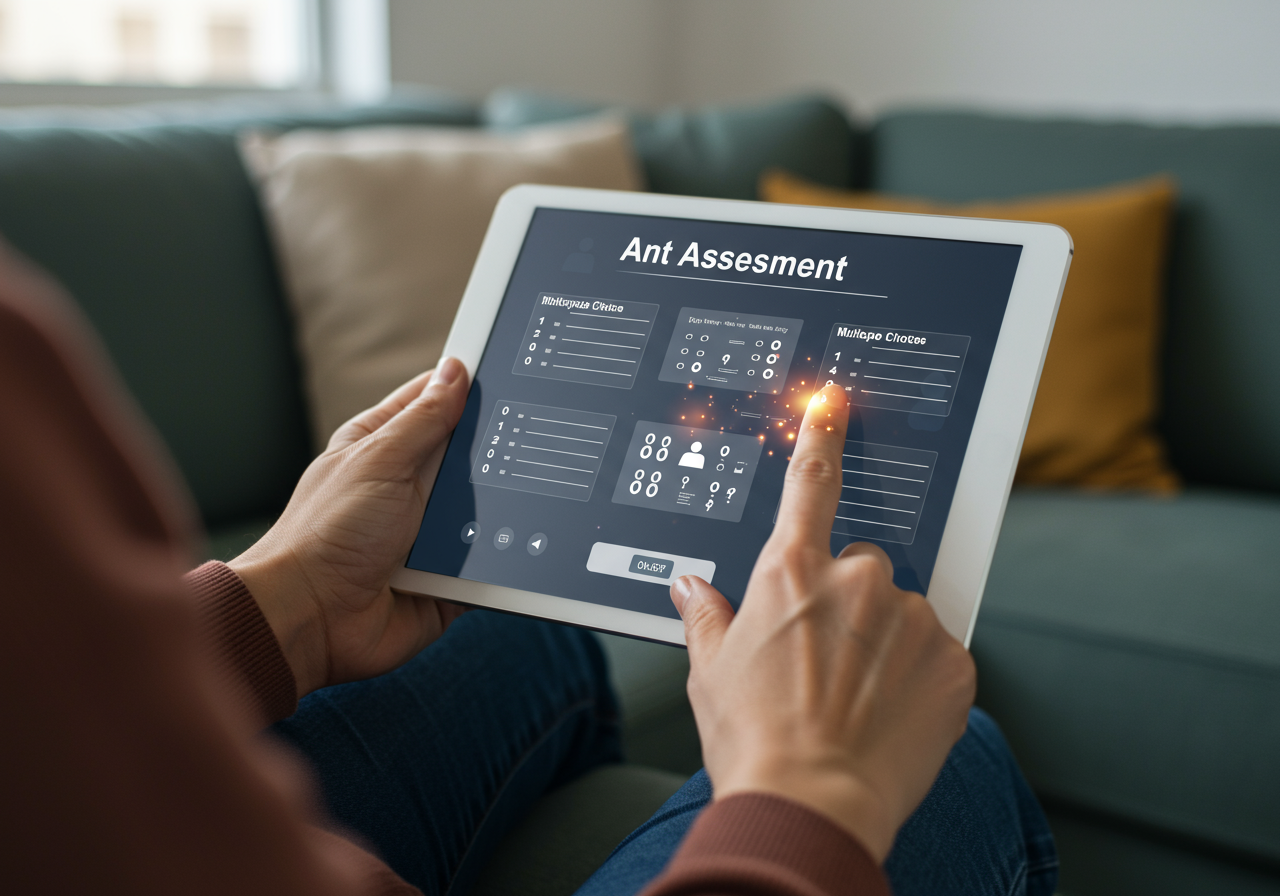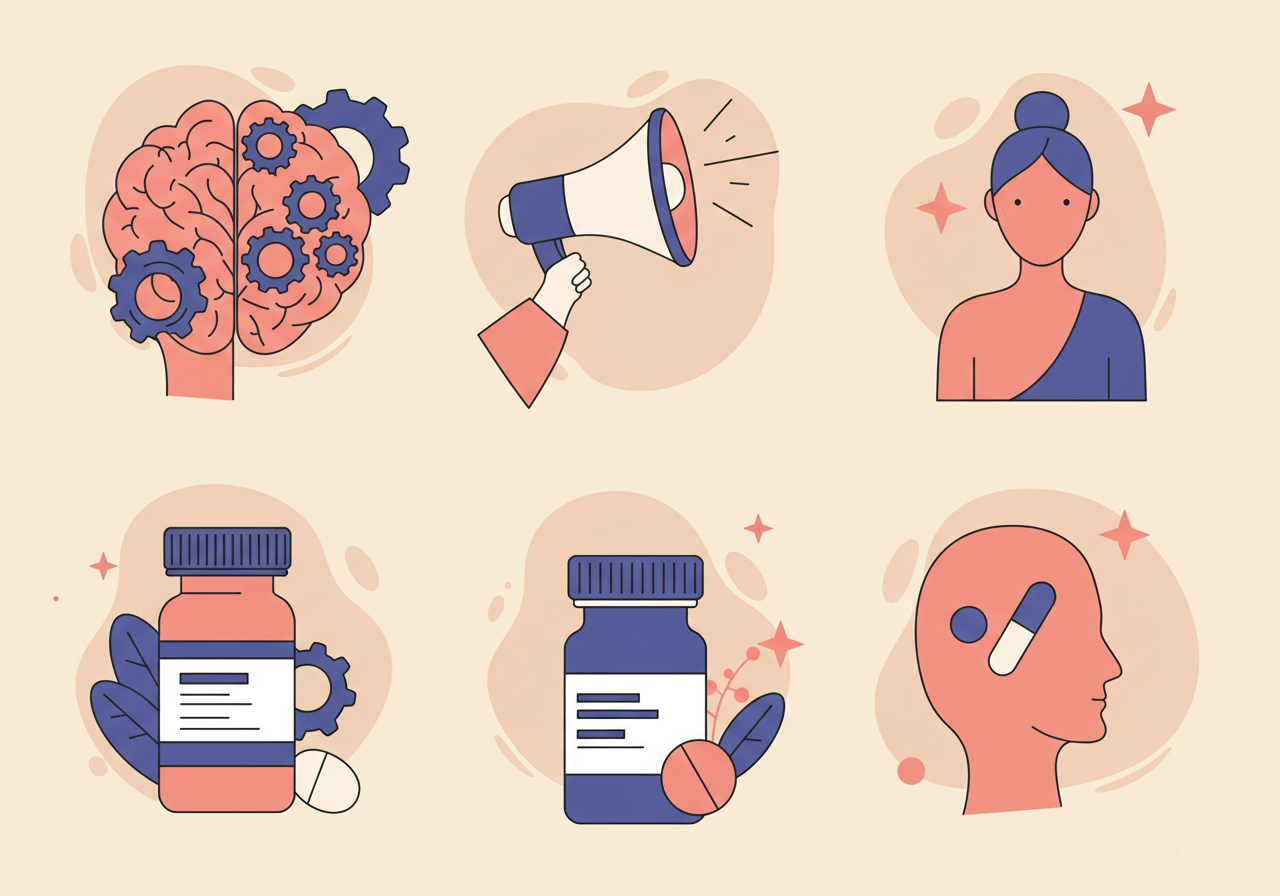Online Adult ADHD Assessment: Symptoms & Next Steps
July 21, 2025 | By Genevieve Hale
Are you an adult constantly battling disorganization, chronic procrastination, or struggles with focus? You're not alone. Many adults wonder if their daily challenges could be linked to ADHD. This guide explores common signs, the convenience of an adult ADHD assessment, and essential next steps toward clarity and support. Curious how to get an ADHD assessment? For many, the journey begins with understanding the symptoms and taking a brave first step, often through an online screening tool.
We'll guide you through recognizing the traits of adult ADHD, explain how a science-backed online screener works, and clarify what to do with your results. Feeling understood is the first step toward empowerment.
Recognizing Adult ADHD Symptoms
Understanding ADHD symptoms adults experience is crucial because they often look different from childhood symptoms. The stereotypical image of a hyperactive child doesn't capture the nuanced ways ADHD can manifest in adulthood, impacting careers, relationships, and self-esteem. It's about more than just an inability to sit still; it's a persistent pattern of inattention and/or hyperactivity-impulsivity that interferes with functioning and development.

Inattentive ADHD: More Than Just Daydreaming
Many adults, especially women, experience the primarily inattentive presentation of ADHD. This goes far beyond simple daydreaming. It involves a genuine, often frustrating, struggle to maintain focus on tasks that are not highly stimulating. The inattentive symptoms can feel like a constant mental fog, making it difficult to organize tasks, follow through on instructions, or remember appointments.
Common signs include:
- Making careless mistakes at work or in other activities.
- Difficulty sustaining attention during lectures, long readings, or conversations.
- Appearing not to listen when spoken to directly.
- Struggling to follow through on instructions and failing to finish projects.
- Chronic disorganization with tasks, belongings, and time management.
- Avoiding tasks that require sustained mental effort.
- Frequently losing essential items like keys, wallets, or phones.
Hyperactivity & Impulsivity in Adult Life
For adults, hyperactivity often becomes more internalized. Instead of running and climbing, it may present as a feeling of constant inner restlessness. The hyperactive-impulsive symptoms can be just as disruptive, leading to challenges in both professional and personal settings. It's the feeling of being driven by a motor that you can't turn off.
These symptoms can manifest as:
- Fidgeting, tapping hands or feet, or squirming in your seat.
- Feeling restless and unable to stay seated during meetings or meals.
- Talking excessively and often dominating conversations.
- Blurting out answers before a question has been completed.
- Difficulty waiting your turn in lines or in traffic.
- Interrupting or intruding on others' conversations or activities.
- Making rash, impulsive decisions regarding finances, relationships, or career choices.
How Undiagnosed ADHD Impacts Daily Life and Relationships
When ADHD goes unrecognized, the impact on daily life can be profound. Adults may internalize their struggles, leading to feelings of being "lazy," "incompetent," or "a failure." This can result in chronic stress, low self-esteem, anxiety, and depression. Professionally, it can lead to underachievement, frequent job changes, and workplace friction. In relationships, forgetfulness, impulsivity, and difficulty with emotional regulation can cause misunderstandings and conflict. Recognizing these patterns is the first step toward finding solutions and self-compassion.
The Convenience of Online ADHD Screening
In today's fast-paced world, finding time for in-person appointments can be a significant barrier. This is where online ADHD screening offers a valuable and accessible alternative. It provides a private, pressure-free environment to explore your symptoms and gain initial insights before committing to a formal diagnostic process. This first step can be incredibly empowering.
Why Consider an Online Self-Assessment?
An adhd self assessment serves as a vital preliminary step. It is a structured way to reflect on your experiences based on scientifically validated criteria, like the Adult ADHD Self-Report Scale (ASRS) developed in conjunction with the World Health Organization. The primary benefits are privacy and accessibility. You can complete the assessment from the comfort of your home, at your own pace, without the immediate pressure or cost of a clinical appointment. It helps organize your thoughts and provides a concrete starting point for a conversation with a healthcare professional.
Understanding How Adhdassessment.me Works
On our platform, we've streamlined this process to be as insightful and user-friendly as possible. Our platform guides you through a questionnaire based on established diagnostic criteria from the DSM-5. The core of our service lies in offering optional personalized reports. This unique feature goes beyond a simple score. The platform analyzes your response patterns to provide deeper insights into your unique cognitive style, potential strengths, and specific challenges. You receive a comprehensive report that can serve as an excellent foundation for understanding yourself better and preparing for the next steps. Why not start your assessment now?

What Your Online Assessment Report Reveals
Your screening report adhd from our platform is designed to be a clear and informative document. It provides a summary of your responses, highlighting areas that align with ADHD traits. If you opt for the detailed analysis, the report will also offer personalized insights into how these traits may affect different areas of your life, from work productivity to personal relationships. It's important to remember this is a screening tool, not a diagnosis. Its purpose is to arm you with information and confidence to move forward.
Your Next Steps: From Screening to Support
Receiving your screening results is not the end of the journey; it's the beginning of a new, more informed chapter. Knowing how to get assessed for ADHD formally is the critical next phase. Your online report is the perfect tool to facilitate this process, providing a structured summary of your concerns.
Preparing for a Professional ADHD Consultation
Walking into a doctor's office with your screening report in hand can make all the difference. To prepare for your consultation:
-
Print Your Report: Bring a copy of your results from the online ADHD assessment.
-
List Specific Examples: Think of real-life examples of how your symptoms have impacted your work, studies, and relationships.
-
Gather History: If possible, recall when these challenges began. ADHD is a neurodevelopmental condition, so symptoms must have been present before age 12, even if they weren't recognized then.
-
Write Down Questions: Prepare a list of questions you have for the professional.

Finding the Right Professional for a Formal ADHD Diagnosis
The right professional is key to a formal diagnosis. Look for a psychiatrist for adhd assessment, a clinical psychologist, or a neurologist with experience in adult ADHD. These specialists are qualified to conduct a comprehensive evaluation, which may include clinical interviews, additional rating scales, and a review of your personal history. Your primary care physician is often a great starting point for a referral.
Beyond Diagnosis: Exploring Support and Management Strategies
A diagnosis is not a label but a roadmap. It opens the door to effective strategies for living with adhd adults successfully. Support can come in many forms, including:
-
Therapy: Cognitive Behavioral Therapy (CBT) is highly effective for managing ADHD symptoms.
-
Coaching: ADHD coaches can help with practical skills like organization and time management.
-
Medication: For many, medication is a highly effective tool for managing core symptoms.
-
Lifestyle Adjustments: Regular exercise, a balanced diet, and good sleep hygiene are foundational.

Empower Your Journey: Take the First Step Towards Clarity
Understanding whether your lifelong struggles with focus, organization, and impulsivity are linked to ADHD is a transformative realization. It shifts the narrative from self-blame to self-awareness. Recognizing the symptoms in yourself is the first courageous act. The next is taking a concrete step to explore those feelings.
An online screening can bridge the gap between suspicion and certainty, providing you with the data and confidence to seek professional guidance. Ready to take the next step? Explore our free tool today and receive personalized insights that can illuminate your path forward. Your journey to clarity starts here.
Frequently Asked Questions About Adult ADHD Assessment
Is this online assessment a formal ADHD diagnosis? No, it is not. Our online tool is a powerful screening instrument designed to help you identify traits consistent with ADHD. A formal diagnosis can only be made by a qualified healthcare professional, such as a psychiatrist or psychologist, after a comprehensive clinical evaluation. We encourage you to use our report as a starting point for that conversation.
What is the typical assessment for ADHD? A typical formal assessment involves multiple steps. It usually includes a detailed clinical interview about your current symptoms and past history, standardized rating scales (like the ASRS or Conners'), and sometimes interviews with a family member. The clinician will also rule out other conditions that can mimic ADHD symptoms.
Can ADHD develop later in life? ADHD is a neurodevelopmental disorder, which means it originates in childhood. However, it is very common for it to go undiagnosed until adulthood, when the demands of work, higher education, or family life make the symptoms more apparent and disruptive. So while it doesn't "develop" in adulthood, it can certainly be "discovered" later in life.
Is it worth getting tested for ADHD? For many adults, getting tested is life-changing. It can provide an explanation for lifelong struggles, reduce self-blame, and open the door to effective treatments and coping strategies. Understanding your brain's unique wiring allows you to work with your strengths and support your challenges. To see if it might be a worthwhile step for you, a great place to begin is with an ADHD self assessment.
How much does an ADHD assessment cost? The cost of a formal ADHD assessment can vary significantly depending on your location, insurance coverage, and the type of provider you see. It can range from a few hundred to several thousand dollars. An online screening tool provides a highly affordable first step to determine if pursuing a formal, more costly evaluation is warranted.
Disclaimer: This article is for informational purposes only and does not constitute medical advice. It is not a substitute for professional medical advice, diagnosis, or treatment. Always seek the advice of your physician or other qualified health provider with any questions you may have regarding a medical condition.